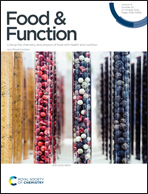Artemisia sphaerocephala Krasch polysaccharide promotes adipose thermogenesis and decreases obesity by shaping the gut microbiota
Abstract
This study was designed to investigate the underlying mechanism of Artemisia sphaerocephala Krasch polysaccharide (ASKP) against obesity. Here, our results showed that ASKP considerably reduced body weight gain and metabolic disorders in high fat diet (HFD)-fed mice. 16S rRNA gene sequencing revealed that ASKP relieved the gut microbiota disorder caused by HFD and promoted the proliferation of probiotics such as Lactobacillus, Bifidobacterium and Blautia. Interestingly, the fecal levels of succinate, a microbial metabolite associated with adipose thermogenesis, were dramatically elevated by ASKP treatment in obese mice. Accordingly, ASKP promoted thermogenesis of brown adipose tissue (BAT) and browning of inguinal white adipose tissue (iWAT) of mice fed with a HFD, as revealed by the elevated expression of thermogenic marker genes (UCP1, CIDEA and PGC1α) in BAT and iWAT. Importantly, antibiotic treatment significantly decreased the ASKP-elevated fecal levels of succinate and further abolished the adipose thermogenesis effects of ASKP. Taken together, our results show that ASKP prevents obesity through iWAT browning and BAT activation, a mechanism that is dependent on the gut microbiota metabolism.



 Please wait while we load your content...
Please wait while we load your content...